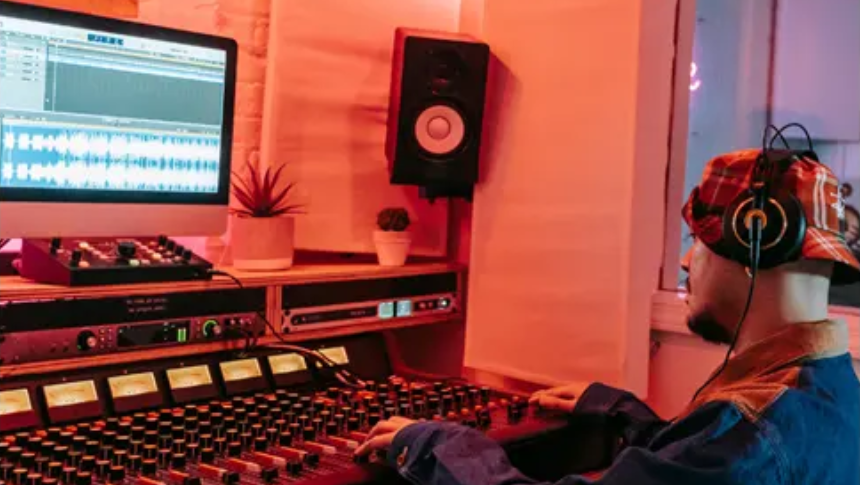When you think of a musician, an image of a pop star holding a guitar on stage at a concert probably comes to your mind. In reality, the global music industry is enormous and employs millions of people working in different capacities.
If you are musically inclined, you can choose from a wide variety of roles, from songwriters to media producers. However, irrespective of your dream music career role, you need to be prepared for a lot of ups and downs throughout your career.
Let’s dive into the different types of career roles you can find in the modern music industry. We will also explore a career path in music production and what you can do to become a successful music producer.
What kind of music professional can you become in the entertainment industry?
Career diversity is a major attraction of the music industry. If you have a passion for music and talents and skills to match, you can choose from a wide variety of roles within the entertainment domain.
Here are some of the most common music career roles you can expect as a music college graduate:
- Independent artist
- Major label artist
- Songwriter or composer
- Session musician
- Orchestra musician
- Music producer
- Music teacher
Why should you pursue a career path in music production?
Music production is a great career path if you are inclined towards a musical career but also have an aptitude for business and technology. It combines the best of both worlds and lets you have a successful career in the global music domain.
Here are some of the prime advantages of choosing a career in music production.
- As a music producer, you get to create good music yet stay away from the toxic competitiveness present in the industry.
- Many music producers are actively involved in the creation of music and soundtracks. Therefore, choosing a music production career doesn’t rob you of the chance to display your musical creativity.
- Music producers are often the first point of contact for major labels and artists to partner for music albums. As a music producer, you can get a chance to meet the who’s who of the music world.
- Most music producers are known to make a lot of money. Erieri.com estimates the average salary for a music producer in London to be £50,162 per year.
What kind of career prospects can you expect as a music producer?
It is a myth that choosing music production as a career path limits your job diversity. Music production graduates from a reputed music school like the London College of Creative Media (LCCM) enjoy an immense variety of career roles.
Here are some of the most fascinating jobs in the music production sector which might catch your fancy:
- Musical project manager
- Film score manager
- Studio producer
- Recording mix engineer
- Computer music designer
- Music library creator
- Executive artist manager
- Label owner
How can you become the best music producer in the industry?
Investing in a good music production programme can provide you with a solid foundation and a great start to your career. However, you need to invest a lot of effort on your own to make it big as a music producer.
Here are some useful tips that can help you become the best music producer in the industry.
- Connect with other musicians in the industry: Knowing and developing strong relationships with other musicians in the industry is important for your growth as a music producer. Therefore, you should focus on meeting new artists and attending networking events within the music industry.
- Be thoroughly familiar with the production process: As a music producer, you should be thoroughly acquainted with every little aspect of your music studio and production set-up. Your familiarity with the process can avoid problems such as costly technical glitches and time required to fix them.
- Intimately know your studio space: Whether you are working in a state-of-the-art music studio or have your own DIY set-up, you should also be aware of every detail in your studio space. Learning about the audio engineering aspects and acoustics can help you take advantage of them to record amazing music.
- Regularly listen to your previous work: Your previous work can be used as a way to record the growth of your technical and music skills over a long period. Listening to your previous work can help you spot your earlier mistakes and avoid them in your upcoming projects. It can also help you understand what you got right and turn these aspects you’re your standard practices.
- Be open to honest feedback: The best way to grow in any music profession is to be open to constructive criticism. Honest feedback from experienced artists or music producers can help you understand the strengths and weaknesses of your work. It can also help you hone your industry skills further.
- Be flexible in working with what you have: Not having the best equipment or studio space can seem restrictive to your goal of producing the best music. However, most successful music producers have often created their best work with humble equipment and only on the basis of their talent. Being flexible and adaptable can allow you to be creative in using what you have to produce great music.
Other great tips include learning how to market your own music and not being afraid of a little negative reaction from the audience. You should also cultivate a professional attitude in all your career-related and personal interactions to avoid missing out on a networking opportunity.
How can a music production programme help you upgrade your skills?
While passion for music is the first thing you need to become a successful music producer, it won’t ensure that you will be able to sustain yourself in a highly competitive industry.
A successful music production career in today’s world requires immense industry and technical knowledge and a strong professional network. Music courses in London can provide the facilities and equipment you need to learn different types of music production.
Additionally, you will receive training in different audio and sound-mixing tools and software that are part of the modern music industry. Pursuing a music business degree from a reputed college can also ensure you get plenty of opportunities to network with important people from the industry.
If you are in search of the right music production course, you should check out the Master’s of Music in Music Production from LCCM. The course helps you develop specialist knowledge in advanced music production tools and techniques.
The course also focuses on a broad-spectrum view of the industry and allows you to learn about music marketing, artist branding and other music business topics.
Click here to explore other USPs of the music production programme at LCCM today.





